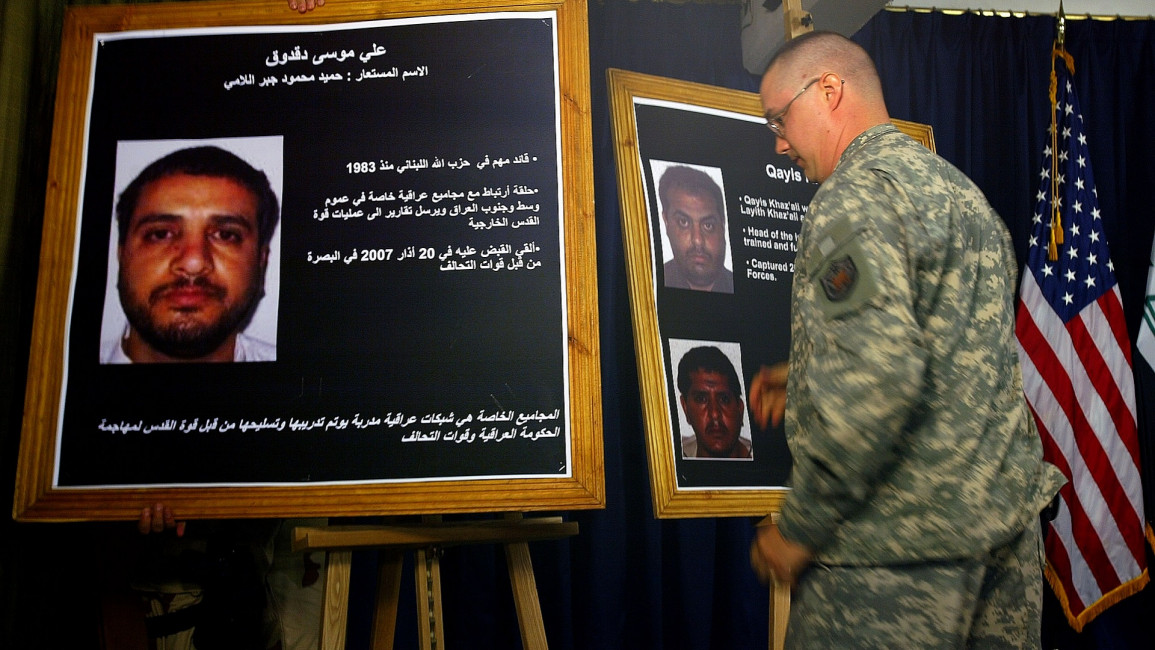Saudi Arabia places Hizballah leaders under sanctions for 'terrorism'
The new list is the largest Saudi has ever put together against Hizballah.
It includes the names of senior military officials and commanders, politicians and industry leaders.
Interestingly, most of the names on the Saudi list are also on a similar US list of sanctioned individuals.
At first glance, the Saudi move appears like a "declaration of war" against Iranian-backed Hizballah's operations outside Lebanon, as many of the names are known to operate in Arab countries and beyond.
The move is probably part of Saudi Arabia's broader confrontation with Iran in the region.
Reacting to the news, the bloc of Hizballah's MPs in Lebanon's parliament said the Saudi move complies with "American dictates", and placed it in the context of a recent bill by the US Congress tightening sanctions on Hizballah.
In focus: The new names on the sanctions list
Mustafa Badreddine (born 1962)
Thought to have been the head of Hizballah's military wing, taking over after the assassination of his brother in law, former commander Imad Mughniyeh, in Damascus in 2008.
|
||
He was arrested in Kuwait in 1983, and convicted on terrorist charges there. He escaped prison during the Iraqi invasion of Kuwait in 1990.
Badreddine is accused of planning the assassination of former Lebanese Prime Minister Rafik Hariri in an explosion in Beirut in 2005, alongside four other Hizballah leaders indicted by the Special Tribunal for Lebanon.
Badreddine is also accused of leading Hizballah's forces in Syria, and has been placed under sanctions by the US government.
Ibrahim Akil (born 1962)
Akil is also under US government sanctions for his alleged role in providing military support to the Syrian regime.
Akil reportedly served as Hizballah's commmander in South Lebanon, and was the right hand man of Imad Mughniyeh, leading military operations against the Israeli army.
Abdul-Nour Shaalan
Another sanctioned by the US government. According to the website of the US embassy in Syria, Shaalan is a businessman with close links to Hizballah leaders, and is involved in supplying weapons to the group and its Syrian affiliates.
|
||
Shaalan is also reportedly involved in brokering arms deals between Hizballah and the Assad regime, and with corporations in Russia, Belarus and Ukraine.
Fouad Shukur
Also sanctioned by the US government. Shukur is accused of playing a key role in Hizballah's military campaign in Syria and is reportedly a member of Hizballah's Jihad Council, the highest military body in the party.
Adham Tabaja
Sanctioned by the US government, Tabaja owns real estate and tourism companies active in Lebanon and Iraq - but is accused of being a Hizballah member.
|
||
One of his companies, Al-Inmaa Engineering and Construction, played a key role in the reconstruction of Beirut's southern suburbs and South Lebanon following the Israeli war on Lebanon in 2006.
The US accuses Tabaja of using his companies to facilitate Hizballah activities.
Qassem Hujaij
Also sanctioned by the US government. Hujaij is a known businessman in Lebanon, with investments in Lebanon and West Africa.
The US accuses Hujaij of using the Middle East and Africa Bank, of which he was CEO before resigning under pressure from Lebanon's Central Bank following US Treasury sanctions, of facilitating Hizballah's activities in Lebanon and Iraq.
Hussein Ali Faour
Faour owns automotive companies and petrol stations in Beirut. He is accused of using his companies to facilitate Hizballah's activities.
Mohammad Youssef Mansour (aka Sami Shihab)
Also sanctioned by the US government. He is accused of leading Hizballah's cell in Egypt, and was previously arrested by the Egyptian authorities and sentenced to 15 years in prison.
He escaped during the Egyptian revolution, making his way back to Lebanon.
Mohammad Kawtharani
Yet another sanctioned by the US government. He is a member of Hizballah's political council, and is reportedly in charge of Iraqi affairs in the Lebanese party.
The US accuses him of helping establish, finance, train and arm Iraqi Shia militias, as well as sending fighters to Syria.
Ali Mussa Daqduq al-Musawi
Daqduq was detained by the US military during its occupation of Iraq in 2007, accused of the murder of five American soldiers and being part of the Quds Force of the Iranian Revolutionary Guard. He was later acquitted in 2012.
Mohamed Najib Karim
No information available at this time
Mohamed Salman Fawaz
No information available at this time



